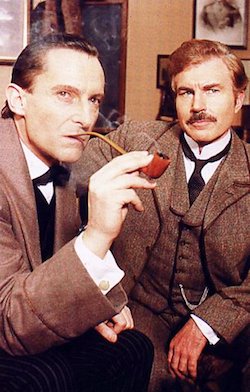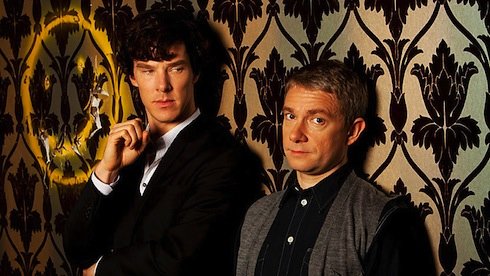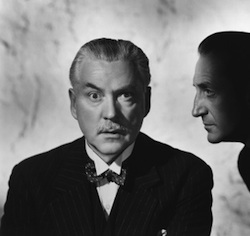Sherlock Holmes initially meant Basil Rathbone to me, and that’s not a bad thing. I saw the movies on TV long before I read the stories, and when I finally did read them, Rathbone fit the role perfectly. Plus, he was a good enough actor to play the part well, and he did it so many times that he’s still the template in the public consciousness.
But the flip side to Rathbone as Holmes is Nigel Bruce as Watson, and there the whole thing falls apart. Because, thanks to this actor and the conception behind his performance, both Holmes and Watson were seriously diminished until very, very recently.
Even now, Watson is still considered a bit of a buffoon to the general public because of Bruce. Physically old and clumsy, mentally credulous and slow to grasp the obvious, he’s the antithesis of the ultra-smart, ultra-insightful Holmes. Yet this not only denigrates Arthur Conan Doyle’s Watson, it makes Holmes look bad. What kind of insecure genius needs to hang out with an idiot just to make himself look smarter? Holmes has a lot of personal issues, but insecurity about his intelligence is not one of them.
It didn’t start out that way. Bruce’s turn as Watson in his first Holmes film, The Hound of the Baskervilles, was good enough. And in its follow-up, The Adventures of Sherlock Holmes, he maintained a certain degree of integrity. The essential casting error—making Watson an older, portly man when he should’ve been a contemporary of Holmes (and as a tough ex-soldier, certainly not physically soft)—didn’t jar too much. But as the series progressed, Watson became less reliable, less resourceful, until he at last turned into the dim sidekick of popular memory. Even in my favorite Holmes movie, 1979’s Murder by Decree, James Mason can’t entirely shake the Nigel Bruce effect in his take on Watson.
 The reclamation began with the BBC Jeremy Brett series. Their first Watson, David Burke, in my opinion nailed it: he was a mature but not elderly man, he was a competent doctor and a decent human being, but most importantly he was not an idiot. He was, as Doyle always intended, the audience’s stand-in, and because he was as smart as us, he made Holmes appear even smarter. That’s always been the core of the concept, and the reason Doyle chose Watson’s voice and not Holmes’s to narrate the stories.
The reclamation began with the BBC Jeremy Brett series. Their first Watson, David Burke, in my opinion nailed it: he was a mature but not elderly man, he was a competent doctor and a decent human being, but most importantly he was not an idiot. He was, as Doyle always intended, the audience’s stand-in, and because he was as smart as us, he made Holmes appear even smarter. That’s always been the core of the concept, and the reason Doyle chose Watson’s voice and not Holmes’s to narrate the stories.
Burke was succeeded in the BBC show by Edward Hardwicke, who was good but lacked Burke’s energy. And since then, creators have caught on that Watson, far from being a comedic foil, was actually the voice of reason in the Holmes canon. So even when the overall project has been rather dire, we’ve gotten solid Watsons from the likes of Jude Law and Ian Hart. And most recently Martin Freeman has updated the character in the BBC’s stellar modern-day version.

Holmes gets all the attention, since he’s always the smartest man in the room. He’s also impatient, arrogant, occasionally bullying and very occasionally wrong. We the reader/viewer/audience see past these qualities to the great man underneath because Watson sees past them. So without Watson, we have no way to truly appreciate the world’s greatest detective. And if you make Watson an idiot… well, what does that make us?
Alex Bledsoe is author of the Eddie LaCrosse novels (The Sword-Edged Blonde, Burn Me Deadly, and the forthcoming Dark Jenny), the novels of the Memphis vampires (Blood Groove and The Girls with Games of Blood) and the first Tufa novel, The Hum and the Shiver.











For my money, David Burke did solid work as Watson, but Edward Hardwicke was far superior.
Martin Freeman is the best Watson ever, based on work to date. I am a Jude Law fan, but that guy he is playing is not Watson.
James Mason’s Watson in “Murder By Decree” is downright cringe-worthy at times. The whole “pea” scene just makes him seem like a childish simpleton that Holmes tolerates out of love. It undercuts the moments where we see Watson actually doing intelligent and brave things.
As for the article,I wholeheartedly agree, competant Watsons make for a better Holmes.
DavidA, I agree with you. When I first saw David Burke’s Watson, I was very, very happy, but Edward Hardwicke won me over with his portrayal.
I have to say, Jude Law is closer to Watson than Robert Downey, Jr. is to Holmes. His Holmes is basically a scruffy Tony Stark with an English accent. And yet I will still watch A Game of Shadows. *sigh*
Martin Freeman is a wonderful Watson. That is all.
I enjoyed both the Downey Holmes films but I don’t really consider them “real” Sherlock Holmes films, rather an alternate univers version. But I DO love Jude Law’s Watson. I’ve started judging Holmes on film and TV by the Watsons. Freeman is an excellent Watson as well bit I really love Law’s interpretation.
@@.-@. I agree. The new Holmes films to me are a campy alternate universe Steampunk or Gaslight Holmes and Watson. I do like the New BBC series take on the pair and enjoy watching the series. Rathbone and Bruce are still the iconic film versions though the author is right that Bruce’s Watson appeared to suffer from Alzheimer’s as the series wore on.
Still any interpretation is better than “The Seven Percent Solution” with Nicol Williamson as Holmes and Robert Duval of all people as Watson. I remember it being sleep inducing. Sherlock Holmes meets Sigmund Freud?????
I was fortunate to have read the entire Sherlock Holmes canon long before encountering any film, TV or radio version, so while atrocities like Nigel Bruce’s parody of the Great Detective’s associate and chronicler annoy me they cannot distract me from the mental image Conan Doyle painted for me so long ago.
I find the Brett / Burke rendition closest to my expectations; however, the recent and current film portrayals do present a rousing story. (-:
The Jeremy Brett series were surely produced by Granada, not the Beeb. For a first-rate Watson, try to hunt down some of the 1980s Lenfilm adaptations – Vitaly Solomin was ver’ good indeed, tho’ the actual Holmes tended towards parody. The Lenfilm adaptations were high-end late Soviet productions, respectful of the original texts, but set in a strange late-C19th England full of dachas. They are (ahem) findable, in subtitled versions. The Baskervilles is first rate. The Henry Baskerville was a complete da tovarich wodka! Russian stereotype, and Dr Mortimer’s dog was called Snoopy (a LOL moment).
Andre Morell in Hammer’s 1959 version of Hound was pretty good too – you could believe he used to be a soldier.
But yes, I adore both Burke and Hardwicke, and Solomin (pretty!) and for different reasons Freeman.
Ritchie’s films? No thanks.
One of the things I love best about Martin Freeman’s Watson is how that series makes his experiences as an army man a key motivator in his new life with Sherlock. How did Gatiss’s Mycroft put it? “You’re not haunted by the war, Dr. Watson. You miss it. Welcome back.” And you see on Watson’s face that that’s exactly it.
I have long detested all things Holmes, for exactly the reasons you state. The main character is an insufferable brat, true, but what they did to Watson was reprehensible.
When the farce, “Without a Clue” came out, casting Ben Kingsley as Watson and Michael Caine was Holmes and reversing the roles – Watson is the brains and Holmes is merely an actor, hired to play front man – it quickly became one of my favorite movies. The writing is amusing, the actors are perfect and the whole thing redeemed the Holmes stories in my mind.
I may have to give the new incarnation another chance. I saw enough of it to see that Holmes was once again insufferable and left it at that. However, if Watson has been given a fair shake, it might make Holmes worthwhile.
Thanks for an insightful article!
Good article. I always thought the Bruce character was all wrong. I loved the Sherlock Holmes stories when I was a kid. My impression of Watson was that he was direct, a man of action, utterly loyal, smart but not in a showy way, and fearless – exactly the kind you would want backing you up in a tight situation. He was an army doctor, after all who did a tour in Afghanistan. I haven’t seen some of the other versions mentioned here, but I would love to see a more balanced view of the two main characters – they’re both pretty cool in their own way.